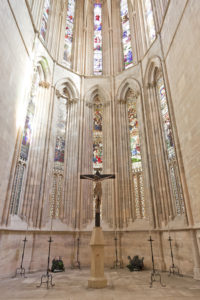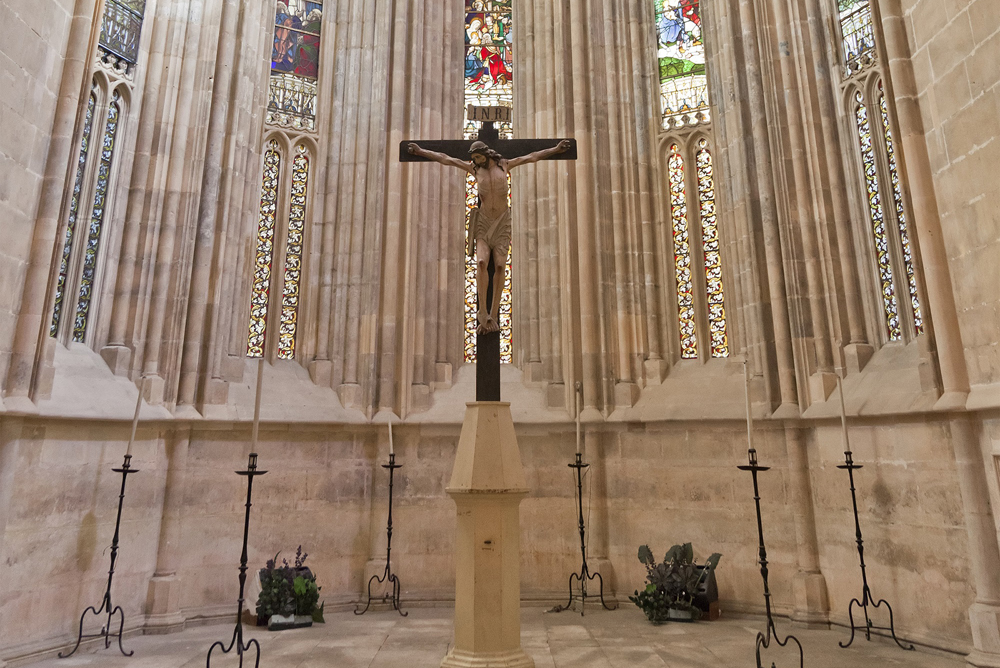
My grace is sufficient for you,
for power is made perfect in weakness.
2 Corinthians 12:9
SUFFERING
If God is perfect love and perfect goodness, why does he allow suffering? Sometimes God wants to heal the suffering caused by illness through prayer and the sacraments (see chapter 4, especially the section on the anointing of the sick). God’s healing is a wonderful experience of his love and often a great sign to others of his reality and power.
Other suffering does not seem to yield to even the most fervent prayer. How do we reconcile such suffering with God’s mercy and power?
The simple answer is that we can’t, at least not fully. Our perspective is too small. It is only when we are face-to-face with God that we will understand how the big and small sufferings in the history of humanity helped shape God’s perfect plan of love.
The simple answer is that we can’t, at least not fully. Our perspective is too small. It is only when we are face-to-face with God that we will understand how the big and small sufferings in the history of humanity helped shape God’s perfect plan of love.
This is where trust comes in. We are called to put absolute faith in God, trusting that he works for our good in every situation. We might think of parents taking their young children to the doctor for their shots. These innocent babies cannot grasp the necessity of this painful experience. Even parents can find it difficult to put their children through this, but they know it is for a greater good, for their children’s overall health and for the health of those around the child. Approaching pain and disappointment in this way, knowing that God the Father has the best possible intentions for us, his children, alleviates the worry and anxiety surrounding suffering.
We also need to remember that suffering is a result of original sin, and God is making good use of the mess original sin created. Even if we cannot see the meaning of our suffering, God can use it for our salvation, as well as for the salvation of others.
St. Paul the Apostle had an affliction that he prayed the Lord would relieve, and the Lord’s response was, “My grace is sufficient for you, for power is made perfect in weakness” (2 Corinthians 12:9). St. Paul learned to embrace his suffering: “Now I rejoice in my sufferings for your sake, and in my flesh I am filling up what is lacking in the afflictions of Christ on behalf of his body, which is the church” (Colossians 1:24). Paul is not saying that Christ’s sacrifice is insufficient; what can be lacking is our participation in his suffering for the salvation of the world. We can unite our sufferings to those of Jesus Christ for the good of ourselves and others—for the whole body of Christ, his Church!
We can’t ignore the suffering in our lives and in our world. In all things we should turn to God, our Creator and Father, ask for his healing and help, and trust in the plan he has for us.
CHASTITY
What is chastity? A lot of people might think of it as simply celibacy, but that’s not the only expression of it. Chastity is a virtue and a grace, and we are all called to be chaste, whether single or married (see CCC, 2348–2350).
Chastity is the interconnecting of our physical and spiritual sides, creating the perfect form of human sexuality—sexuality as God intended it. Chastity sustains our existence in the capacity of love and being, and it demands an integrity of the person along with an entire gift of self (see CCC, 2337–2347). When living a chaste life, a person experiences freedom, fulfillment, and growth, which invigorate and empower the person in every aspect of their lives. Imagine a symphony, its various parts combining and pouring forth one strong, impeccable melody. Through chastity we become the best version of ourselves.
Chastity is an imitation of Christ’s purity. It involves self-mastery, which leads to freedom: “Either man governs his passions and finds peace, or he lets himself be dominated by them and becomes unhappy” (CCC, 2339). We are not meant to be slaves to our passions and desires. By way of grace and an act of our will, we choose what is good and rise to claim our dignity as human beings.
Through chastity, we give the gift of self to another. Chastity is expressed as friendship, whether of the same or opposite sex. The love and loyalty found in chaste friendships are a strong witness to God’s fidelity and kindness (see CCC, 2346-2347).
Offenses against chastity include entertaining sexual thoughts, viewing pornography, masturbation, and any and every sexual act that separates the unitive and procreative elements of the sacred marriage act. Chastity leads us to deeper relationships with God and with others. St. Augustine wrote in his Confessions, “Indeed it is through chastity that we are gathered together and led back to the unity from which we were fragmented into multiplicity” (quoted in CCC, 2340).
The road to chastity is not an easy one; it can require constant vigilance and perseverance. We must remember that God is love. He loves each person deeply as a son or daughter; he loves us exactly how we are, right where we are. He loves us in this very moment, even in our brokenness and imperfection.
How do we react to unhealthy inclinations in the area of sexuality? The culture suggests the easy and wide road of following our desires. But St. Peter warns of the “worldly desires that wage war against the soul” (1 Peter 2:11). Jesus calls us to true freedom and discipleship: “Whoever wishes to come after me must deny himself, take up his cross, and follow me” (Matthew 16:24).
THE FOUR LAST THINGS: DEATH, JUDGMENT, HEAVEN, AND HELL
Because of original sin, the result of the fall of man, we all face physical death, which is the separation of the soul from the body (see Genesis 3:19). At the moment of death, we will be judged; this is called the particular judgment (see CCC, 1022). The general judgment will take place at the end of time, when Jesus comes again in glory and the righteous are reunited with their bodies in a glorified form.
Each person’s faith journey is different. We cannot judge anyone’s standing with God; only God knows what goes on inside the mind and heart. We can certainly pray for the deceased, and we trust in God’s merciful love for each person.
Heaven is the place of perfect union with God, the Holy Trinity. It will be a state of never-ending love, happiness, and peace. There righteous souls will behold the glorious face of God.
Hell is reserved for souls who reject God. It is a place of complete separation from him.
Accepting the reality of heaven and hell is essential to our faith foundation. Through loving God and our fellow humans, we strive to be worthy of heaven and help others get there too. In turn, we must be aware of the reality of hell to avoid it, by rejecting sin and doing God’s will.
When the Son of Man comes in his glory, and all the angels with him, he will sit upon his glorious throne, and all the nations will be assembled before him. And he will separate them one from another, as a shepherd separates the sheep from the goats.
He will place the sheep on his right and the goats on his left. Then the king will say to those on his right, “Come, you who are blessed by my Father. Inherit the kingdom prepared for you from the foundation of the world.”
“For I was hungry and you gave me food, I was thirsty and you gave me drink, a stranger and you welcomed me, naked and you clothed me, ill and you cared for me, in prison and you visited me.”
Then the righteous will answer him and say, “Lord, when did we see you hungry and feed you, or thirsty and give you drink? When did we see you a stranger and welcome you, or naked and clothe you? When did we see you ill or in prison, and visit you?”
And the king will say to them in reply, “Amen, I say to you, whatever you did for one of these least brothers of mine, you did for me.”
Then he will say to those on his left, “Depart from me, you accursed, into the eternal fire prepared for the devil and his angels. For I was hungry and you gave me no food, I was thirsty and you gave me no drink, a stranger and you gave me no welcome, naked and you gave me no clothing, ill and in prison, and you did not care for me.”
Then they will answer and say, “Lord, when did we see you hungry or thirsty or a stranger or naked or ill or in prison, and not minister to your needs?”
He will answer them, ”Amen, I say to you, what you did not do for one of these least ones, you did not do for me.” And these will go off to eternal punishment, but the righteous to eternal life. (Matthew 25:31-46)
PURGATORY
To enter heaven and behold the face of God, we must be in a state of perfect holiness. If we die in God’s grace but without having our souls completely cleansed, we will go to purgatory, a state of final purification (see CCC, 1030-1031). The cleansing fire of purgatory, although probably not very pleasant, is sweetened by the certainty that we will reach God.
It is important to pray for loved ones and others who have passed away. Our prayers help them reach heaven faster, should they be undergoing purification in purgatory. Holy souls in purgatory know that we are praying for them, and once they arrive in heaven, they gratefully pray for our salvation.
The reality of purgatory is attested to in the Bible:
[F]or no one can lay a foundation other than the one that is there, namely, Jesus Christ. If anyone builds on this foundation with gold, silver, precious stones, wood, hay, or straw, the work of each will come to light, for the Day will disclose it. It will be revealed with fire, and the fire [itself] will test the quality of each one’s work. If the work stands that someone built upon the foundation, that person will receive a wage. But if someone’s work is burned up, that one will suffer loss; the person will be saved, but only as through fire. (1 Corinthians 3:11-15, emphasis added)
SPIRITUAL WARFARE IS REAL
Earth is a battleground of good and evil. Because of original sin, “the devil has acquired a certain domination over man, even though man remains free” (CCC, 407).
Man’s original sin came through the seduction of Satan, the father of lies. He convinced man that he didn’t need God and that he could be his own god. This seduction to sin, and more specifically to the sin of pride, is alive and well today. “Your opponent the devil is prowling around like a roaring lion looking for [someone] to devour” (1 Peter 5:8).
Many people in our society promote and even romanticize the occult, trying to make it seem harmless. It is not. Ghost hunting, astrology, New Age practices, magic, fortune telling, mediums, and more go against God’s first commandment: “I am the Lord your God. . . . You shall not have other gods beside me” (Exodus 20:2-3). We must stay on the path God gave us and not fall victim to the wiles of the evil one.
God is stronger than the devil. Jesus gave us several examples of how to combat the evil one (see Mark 5:1-20; 9:14-29; Luke 4:1-13; 7:21). Catholic author Neal Lozano outlines five steps you can take each day to remain strong against Satan: repent and believe in Jesus, forgive anyone who has hurt you, renounce the evil one and his ways, take authority in Jesus’ name over the evil one, and ask for the Father’s blessing on all that you do.
St. Michael the Archangel is a great warrior for us against the devil (see Revelation 12:7-8). The St. Michael Prayer, which many Catholics pray after Mass and after the rosary, is included in chapter 12, “Catholics Prayers.”
MIRACLES
God has made his existence known throughout history in many ways, including miracles. In Scripture we see how he created everything out of nothing, parted the Red Sea for his people, and raised Jesus from the dead, to name just a few incidents (see Genesis 1; Exodus 14; Matthew 28). Our God is a God of power!
Scientifically proven miracles have continued through the ages of Christendom and across the world, often through the intercession of Mary and the saints. For example, the Blessed Virgin Mary appeared at Tepeyac, Mexico, under the name Santa María de Guadalupe, in 1531 and left her image on the cloak of a poor native. Over ten million indigenous people were brought to Christ through this image, still viewed today at a large cathedral in Mexico City.
St. Padre Pio is a modern-day saint who experienced many miracles—bilocation, healing, words of knowledge and wisdom—all for the salvation of people and the glory of God.
SUGGESTED READING
- Chastity Is for Lovers: Single, Happy, and (Still) a Virgin, Arleen Spenceley.
- The Four Last Things: A Catechetical Guide to Death, Judgment, Heaven, and Hell, Fr. Wade L. J. Menezes, CPM.
- Healing: Bringing the Gift of God’s Mercy to the World, Mary Healy.
- Heaven Starts Now: Become a Saint Day by Day, Fr. John Riccardo.
- Made for Love: Same-Sex Attraction and the Catholic Church, Michael Schmitz
- Making Sense Out of Suffering, Peter Kreeft.
- Unbound: A Practical Guide to Deliverance, Neal Lozano.
- Why I Don’t Call Myself Gay: How I Reclaimed My Sexual Reality and Found Peace, Daniel Mattson.
This page is taken from the book, A Miracle Awaits: Encountering Christ In His Church by Carol Dintelman, which is available for purchase in print or digital formats here.
Or read the full book online! Click to visit the contents page, endorsements, copyright, acknowledgments, and notes.

